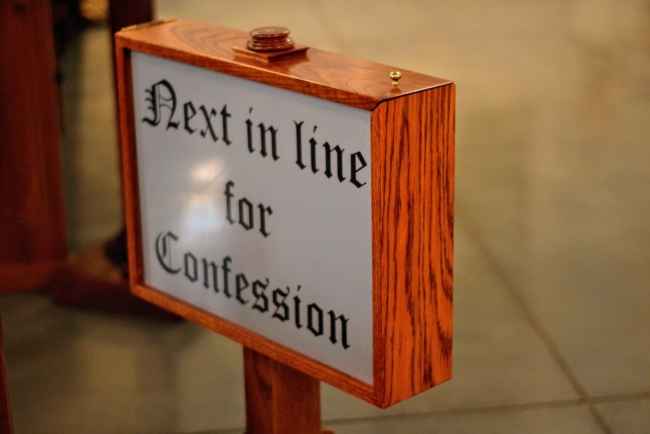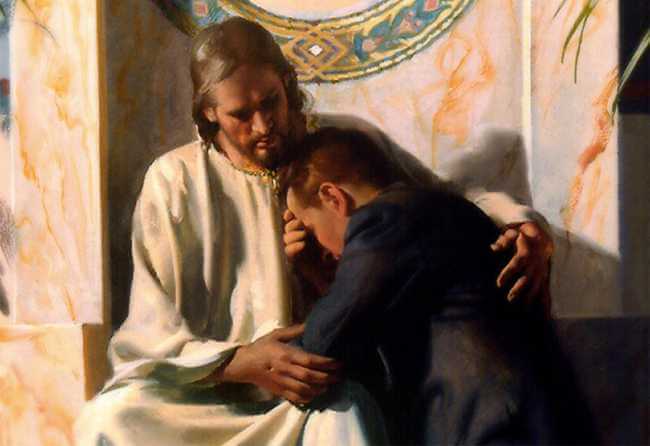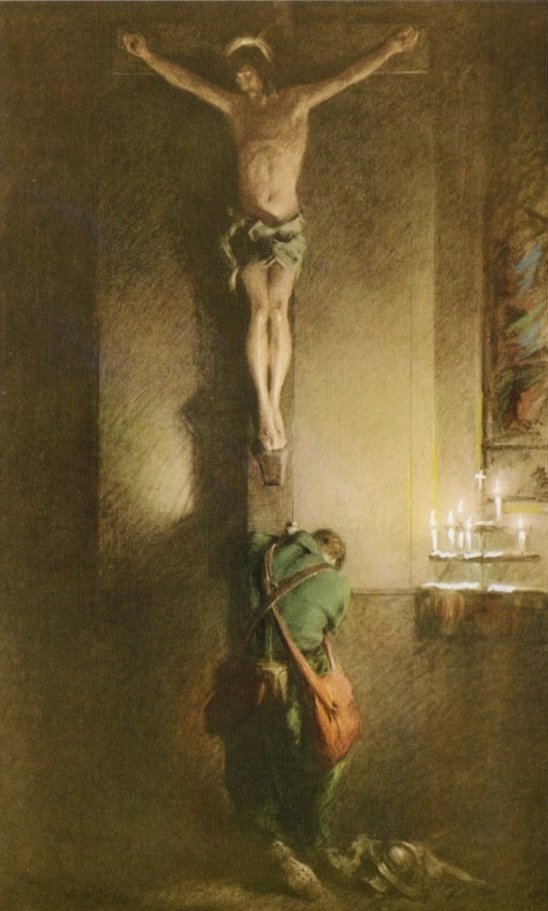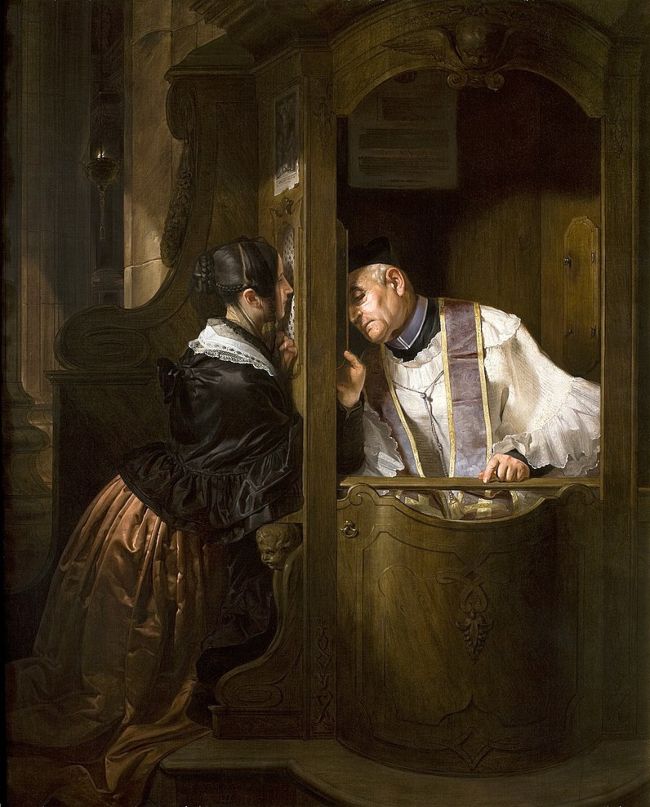
Going to Confession is one of the greatest sources of grace available to us in our Catholic Faith. In this sacrament, the Holy Spirit continues to work in us through conversion and forgiveness. We are enabled to grow in self-knowledge and humility. We begin to see our selfish habits with greater clarity, which makes it possible for us to correct them and root out sin. We purify our consciences, strengthen our wills, receive the grace to resist temptation, and advance in the spiritual life.
For these reasons—and many others—the Catholic Church takes this sacrament very seriously. The United States Conference of Catholic Bishops (USCCB) asks faithful Catholics in the United States to go to Confession at least once during Lent and once during Advent, but good priests and spiritual directors recommend a minimum of once a month. If we only go to Confession once a year (or less!) we will miss out on profound graces and lose track of many transgressions—making it harder for us to recognize our patterns of sin.

The saints, of course, recommended frequent confession. St. Francis de Sales, St. John Vianney, St. Padre Pio, and Pope St. John Paul II are among those who suggested going as often as possible. Pope St. John Paul II and St. Padre Pio went at least weekly to confession.
Even if a room is closed, it is necessary to dust it after a week.
St. Padre Pio of Pietrelcina
Jesus spoke candidly to St. Faustina about Confession. She recorded His words in her Diary, and we’d like to share some of His words with you. These are comforting and beautiful words from Christ about the significance of Confession in the Catholic life. You can find them all in The Diary of St. Faustina: Divine Mercy in My Soul.
What Jesus Told St. Faustina About Confession
Tell souls where they are to look for solace; that is, in the Tribunal of Mercy (the Sacrament of Confession). There the greatest miracles take place [and] are incessantly repeated. To avail oneself of this miracle, it is not necessary to go on a great pilgrimage or to carry out some external ceremony; it suffices to come with faith to the feet of My representative and to reveal to him one’s misery, and the miracle of Divine Mercy will be fully demonstrated. Were a soul like a decaying corpse so that from a human standpoint, there would be no [hope of] restoration and everything would already be lost, it is not so with God. The miracle of Divine Mercy restores that soul in full. Oh, how miserable are those who do not take advantage of the miracle of God’s mercy! You will call out in vain, but it will be too late.
Jesus to St. Faustina (Diary, 1448)
Daughter, when you go to confession, to this fountain of My mercy, the Blood and Water which came forth from My Heart always flows down upon your soul and ennobles it. Every time you go to confession, immerse yourself in My mercy, with great trust, so that I may pour the bounty of My grace upon your soul. When you approach the confessional, know this, that I Myself am waiting there for you. I am only hidden by the priest, but I myself act in your soul. Here the misery of the soul meets the God of mercy. Tell souls that from this fount of mercy souls draw graces solely with the vessel of trust. If their trust is great, there is no limit to My generosity. The torrents of grace inundate humble souls. The proud remain always in poverty and misery, because My grace turns away from them to humble souls.
Jesus to St. Faustina (Diary, 1602)

My daughter, just as you prepare in My presence, so also you make your confession before Me. The person of the priest is, for Me, only a screen. Never analyse what sort of a priest it is that I am making use of; open your soul in confession as you would to Me, and I will fill it with My light.
Jesus to St. Faustina (Diary, 1725)
The flames of mercy are burning me. I desire to pour them out upon human souls. Oh, what pain they cause Me when they do not want to accept them!
Jesus to St. Faustina (Diary, 1074)
So, Why Do We Still Need Reminding?
If each of us sat beneath a crucifix and meditated intently on the greatest act of mercy and love the world has ever known, we would, perhaps, run straight to Confession. Not out of fear of hell, but out of such great love for Jesus, Who washed away our sins in His own Blood.

But the world has always pulled away from the Cross. Meditating on the Crucified Redeemer is not common in the world. It is not even something most people would seek to do or understand. Once again, as in ancient history, we have forsaken the Cross—we have, like Adam and Eve, chosen the forbidden tree and its fruits.
We don’t want to be told “Thou shalt not.” We want to do as we please. The world has fully accommodated us by tempting us with great allure and then absolving us with all kinds of excuses.
Yet Holy Mother Church loves her children so completely that she wants us to abide by the moral absolutes given to us by God. The Church is the firm but quiet voice entreating us to resist the noise of the world. She invites us to Confession at least once a year, but we really should go more frequently. Making use of the sacrament regularly—monthly or even more often—is commonly recommended as a path to peace, healing, pardon, and spiritual growth.
Persisting in sin and not working to eradicate it from our lives removes us from the Merciful Heart of God, which is our true home. It also separates us from communion with the Body of Christ. But the rays of His Divine Mercy call us back to His Heart and to communion with one another. We return there by way of the confessional.
Concluding Thoughts
In the Diary of St. Faustina, Jesus implores sinners to come to the font of His mercy, so that He might pour out unimaginable graces upon us all. Through His Passion, Christ brought redemption to a fallen world. Through the healing power of the Sacrament of Reconciliation, He brings it—over and over again—to your heart and mine.
Confession is important to our spiritual progress in any liturgical season or any season of our lives. It is especially powerful during Lent. Reconciliation and the Lenten season go hand-in-hand. Since Lent is a season of reflection and repentance, Confession is one of the greatest means to enter deeply into this penitential season.
In the wisdom of the Church, the season of Lent exists not only for reflection and repentance, but to build up the Body of Christ in anticipation of Easter. What better way to enter into the true spirit of these 40 days—and prepare for Easter—than by going to the Cross in Confession, casting off our sins, and rising again with Christ?

Through the sacramental ministry of the Church, we receive the grace to be more like our Redeemer. Make it a priority to go to Jesus in Confession regularly. Ask for the forgiveness He wants to give so generously. Receive His merciful and unconditional love. Restore your bond with the Lord, the Body of Christ, and the Church.
Be healed and set free, to rise again in Him.
A Prayer for the Courage to Return to Confession
Lord, You know how much I need You. You know my sinful nature and my weaknesses. You know my sincere but imperfect desire to love You and others better. I know that I cannot return to the grace of God except through You and Your sacrifice on the Cross, and through the font of grace that is Confession.
In Your Passion, You did not put limits on Your love. Help me to give You everything, even the ugliness of my sins, as I return to You in Confession. Help me never to despair because Your Divine Mercy and Your infinite love are my greatest hope and treasure. Help me see this as an opportunity to love You, grow in my love for You, and offer all my love to You.
I place my trust in Your infinite love and mercy, and I ask You for the courage to help me return to the Sacrament of Confession. Jesus, I trust in You. Amen.
Do you have a story to share about returning to the Sacrament of Reconciliation?
Do you have any advice for someone who has been away from the sacrament and is anxious about going to Confession after such a long time?
How does Confession make you feel? What gifts has it brought into your spiritual life?






